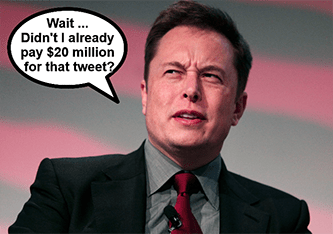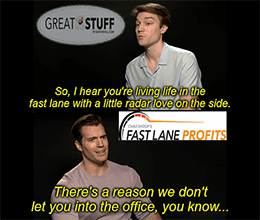
Peloton’s Bestselling Product?
Great Ones, what is Peloton Interactive’s (Nasdaq: PTON) product? What does the company actually sell?
I know it’s supposed to sell fitness equipment. But I’m really starting to have doubts.
Last week, Peloton proved that it’s having considerable trouble selling stationary bikes and treadmills. The company’s recent trip to the earnings confessional detailed all manner of “sins,” including wider-than-expected losses, lower-than-expected revenue and … pardon my French … piss-poor guidance.
PTON stock plunged more than 30% following that abysmal quarterly report — as it should have.
But today … today, Great Ones, PTON rallied more than 10% on news that it actually can sell something.
Confronted with declining fitness equipment sales, Peloton announced that it was returning to its roots to sell the one thing it knows everybody loves on Wall Street: stock.
The company revealed this morning that it will sell an additional $1 billion in new PTON shares. Furthermore, underwriters of the deal will have the opportunity to sell another $150 million PTON shares at the public offering price.
I mean, because why not sell another $150 million when you’re already dropping $1 billion in new shares?
Peloton did not say how it would use the extra funds. But I have a sneaking suspicion it’ll use those funds to help keep the company afloat until it figures out how to sell indoor fitness equipment as everyone rushes outside once again.
The new $1 billion stock offering comes close on the heels of Peloton’s hiring freeze, with both moves clearly designed to rein in expenses and bolster the company’s “consumer-friendly” initiatives. Those initiatives include dumping hordes of money into marketing and new product launches.
Clearly, Wall Street loves Peloton’s latest news. Why else would PTON stock surge 10% on news that it’s replacing the $1 billion it slashed from its full-year guidance with a $1 billion stock offering?
But to me, Great Ones, $1 billion for $1 billion is the definition of a stationary bike. Peloton has literally gone nowhere with this deal. The only way you can view it differently is if you believe that the company has some sort of plan to boost sales figures — despite customers increasingly looking to touch grass instead of staying at home.
As you can probably tell by my not-too-subtle hints, I’m not a very big fan of PTON stock at all right now. To me, this holiday shopping season will decide whether Peloton recovers from this year’s setbacks or becomes another GoPro or Fitbit.
You know I’m betting on the latter, but what do you think, Great Ones? Will Peloton recover? Will Wall Street start caring about the $1 billion in PTON stock dilution on top of its abysmal quarterly report? Or is all that negativity already priced in following last week’s 30% drop?
Let me know your thoughts at GreatStuffToday@BanyanHill.com. Heck, even if you’re tired of hearing about PTON stock, let me know. I’m all ears on this one.
Just Released: Ian King’s Private “Pre-IPO” Portfolio
Over 700 small, innovative companies worth more than $1 trillion altogether could soon go public. That’s why tech investment superstar Ian King just released his new private portfolio. He’s giving his readers details on how they can invest pre-IPO for as little as $10.

Good: EV Lucid-ity

Lucid Motors (Nasdaq: LCID) shares revved higher this morning after the electric vehicle (EV) maker reported more than 17,000 reservations and counting for its “Air” sedan — a luxury car supposedly inspired by the “beauty, innovation and diversity of its home state of California.”
While Lucid’s been California Dreamin’, its CEO Peter Rawlinson has been California schemin’ to overthrow rival EV maker Tesla (Nasdaq: TSLA), which happens to be Rawlinson’s former employer. Dun dun dun!
OK, maybe that’s an over exaggeration. But Lucid does have its sights set on the luxury EV market, and Wall Street’s valuing the company more like Tesla than a traditional automaker:
Ah, yes. Here we have the classic tech company that happens to make EVs … where have I heard that line before?
What’s wild to me is that LCID stock is already up more than 80% since going public via a SPAC back in July, even though it hasn’t turned a profit yet. In fact, Lucid reported a net loss of $1.5 billion in the first nine months of the year, including a $524.4 million loss this quarter.
But as we all know, things like revenue don’t really matter anymore — it’s all about investors’ fee fees and the power of Wall Street’s positive thinking. And what do you know: Wall Street has some pretty warm and fuzzy fee fees for Lucid, if today’s 20% price hike is any indication.
By the way, with EV growth set to surge 1,150% by 2030, there’s still a lot of money on the table. The absolute best way to play EV stocks? Click here for the full story!
Better: You Know, I’m Something Of A Contractor Myself

This morning, Home Depot (NYSE: HD) released third-quarter earnings results that would make Tim “The Tool Man” Taylor proud.
Earnings per share reached $3.92 versus the $3.40 expected, while revenue hit $36.82 billion and topped estimates for $35.01 billion.
Meanwhile, Home Depot’s same-store sales climbed 6.1% this past quarter, beating Wall Street’s estimates of 2.2%. Net income also rose to $4.13 billion, or $3.92 a share — almost a dollar more per share than Home Depot made a year ago.
Not too shabby for a boring blue-chip company, huh?
According to Home Depot, its latest earnings blowout is all thanks to the continued demand for home improvement projects and a strong housing market — despite those pesky inflationary fears and ongoing supply chain constraints. (Dare I say I told you so?)
I guess even after a two-year pandemic that left millions of people stuck in their beige bungalows, there’s still no place like home. And where there’s a will, there’s a home renovation project that’ll set you back a couple hundred dollars … or something along those lines.
As expected, HD shares traded in line with the upbeat news and are now 6% higher on the day.
Best: If The Lawsuit Fits…

Would it even be a normal Tuesday if Tesla didn’t find itself in hot water again over something Elon Musk Tweeted when one of his handlers wasn’t looking? I think not…
For anyone who might’ve missed it, JPMorgan Chase (NYSE: JPM) is suing Tesla for a “breach of contract” over stock warrants — an investment vehicle I talked about just the other day — tied to Elon’s infamous 2018 Tweet.
You know, the one where he told his millions of followers he was “considering taking Tesla private at $420?” Yeah, that Tweet.
According to JPMorgan, Tesla breached the terms of a contract requiring it to deliver either shares of TSLA stock or cash if Tesla’s share price went above a certain strike price when the warrants expired.
Turns out, the warrants JPMorgan bought included provisions that would protect both parties from “certain announcements” that could make Tesla’s share price volatile. And Musk’s time-tested Tweet is exactly the kind of announcement the contract was supposed to cover — or so says JPMorgan.
It’s almost like the bank foresaw a future in which Elon screwed everyone over and then planned accordingly. Hmmm….
Anywho, JPMorgan says even though Tesla’s stock rose almost 900% between Musk’s 2018 Tweet and July 2021 (when the warrants expired), the EV company refused to deliver the cash or shares it agreed to.
Musk and Tesla already paid the SEC $20 million for securities fraud surrounding the Tweet, but JPMorgan still wants its pound of flesh. Not that I can blame it, with some $162.2 million on the line in unpaid dues.
Of course, Tesla doesn’t see things the same way:
We all know that Elon and his corporate lackeys don’t do self-awareness — and this response proves as much.
Thing is, with hedge funds, big banks and institutional investors everywhere owning TSLA stock, a lawsuit like this was bound to happen sooner or later. Someone other than the SEC was gonna take aim at Elon’s Tweet … I’m just surprised it took this long to happen.
Now that it has, Elon might once again have to face the consequences of his own reckless actions — and that’s something we can all smile over, don’t you think?

Looks like WeWork’s ill-fated revival was an inspiration to profitless business zombies everywhere, because this past week … one of the elder meme stock gods … was awakened.
Back from the boneyards of bankrupt BS businesses comes MoviePass, the meme stock OG. Here’s co-founder Stacy Spikes with the deets:
If you didn’t immediately crack up at that crock of crap … let me take you back to that mystical pre-pandemic era … say, 2017.
You’d pay MoviePass $10 a month to see an unlimited number of movies in theaters. MoviePass used to charge upward of $29 to $50 for such a privilege but slashed prices to rock bottom, prompting millions of new subs to sign up and basically live inside the theaters.
Mind you: It’s not like MoviePass had an “in” with cinema chains to get cheaper tickets for its $10-a-month subscribers. The company fronted the full cost of your tickets — every ticket — and essentially lost money on anyone who went to more than one movie a month.

And if you signed up for a moviegoing subscription service, chances are you’d want to milk the ever-loving $#!^ out of the endless movie fest. If your business model is more profitable when people don’t use your product … how do you grow?
How do you, uhhh, stop the constant cash burn? Ain’t no corporate ointment for that.
Before long, MoviePass realized it was more profitable to simply lock people out of their accounts rather than keep doling out free tix.
And it was no surprise when MoviePass and its heavily shorted holding stock folded like laundry by 2019, in a meltdown that would give modern meme stock traders a conniption.
You can imagine how hard it was to contain my excitement to hear MoviePass is back to relish in the post-pandemic moviegoing experience. Oh, happy days. So, what’s different this time?
Co-founder Stacy Spikes is convinced that successfully resurrecting MoviePass is just a matter of doing it properly … which is technically correct. (The best kind of correct.)
If MoviePass could figure out a way to profitably offer a theater-based subscription service — ideally with cinema chain buy-in — you could find an audience for that. Guaranteed.
But for that to happen, the MoviePass zombie has to return as an entirely new beast. A whole new management team. A revised business model. Ideally, a business model that gets profitable the more people use the service, instead of the exact opposite.
Right now, I see a new logo, a new website for the project … and not much else. Is Schrödinger’s MoviePass alive? Is it dead? Nobody knows…
While MoviePass itself might not have changed all that much since its last attempt at being a real company … the rest of the market has. For instance, everyone from AMC Entertainment to Regal Cinemas has already launched their own version of “pay $10 a month for unlimited movies.” Why would any of these theater operators partner with MoviePass now?
Furthermore, the meme stock sagas of GME, AMC, Hertz et al. are well-known in the financial media and retail investors’ consciousness. Wall Street has grown infinitely more detached from reality since MoviePass last slipped into bankrupt obscurity.
And as much as I enjoy pointing at MoviePass and saying: “AHA, stupid business model is stupid!” … we’ve seen some weird market trends over the past couple of years. Like, much more farfetched than MoviePass’s mounting losses.
As Bloomberg’s Matt Levine puts it:
What a time to be alive. When you can go sell pet rocks and rake in wads of crypto cash online, trying to conjure up an endless supply of movie tickets is a terribly boring way to lose money, isn’t it?
While I doubt the staying power of Ethereum-based pet rock NFT markets, you could literally do nothing … sell virtual nothingness into the ether … and make more of a profit than MoviePass ever did.
What do you think, Great Ones? Did you use MoviePass when it was first around? Is MoviePass destined for the meme stock spotlight when it returns to the market? Or is that nonsense so last decade?
Tell me what’s on your mind this week: GreatStuffToday@BanyanHill.com. We’d love to hear from you! In the meantime, here’s where else you can find us:
- Get Stuff: Subscribe to Great Stuff right here!
- Our Socials: Facebook, Twitter and Instagram.
- Where We Live: GreatStuffToday.com.
- Our Inbox: GreatStuffToday@BanyanHill.com.
Until next time, stay Great!

Joseph Hargett
Editor, Great Stuff










